As a doctor, you want to attract more patients and grow your practice. To do this, you need to understand how to approach SEO for doctors in order to maximize patient conversion.
[ez-toc]This article outlines the proven strategies that you can use to make sure your online presence is helping you reach more potential clients. We explore the importance of optimizing website content, engaging in local SEO for doctors, building links, tracking analytics, utilizing social media, and more — all these elements are integral in increasing your SERP ranking so you can get the long-term results you desire.
In this guide, we will explore the key SEO practices especially tailored for doctors. You’ll learn what SEO is and what clicks for doctor websites to be the top choice for patients. Furthermore, you will read about some unique ideas and strategies to keep abreast of the changing digital world to set you apart from the competition.
Hi. I’m Ajay Deep, an SEO professional with a total experience of 11+ years in the digital marketing industry. As a veteran SEO specialist who has worked and spoken to literally thousands of doctors, I know this story all too well. This article is a result of my extensive SEO knowledge and experience working with doctors for their SEO.
Ready to learn the top SEO strategies for doctors? Let’s get started!
What is SEO and How Does it Help Doctors?
Search Engine Optimization (SEO) is a powerful tool that can help doctors get more patients. It’s an effective way to boost visibility, traffic, and branding for any medical practice. SEO involves various techniques and strategies to make a doctor’s website more search engine friendly and user-friendly.
The goal of SEO is to increase the quality and quantity of website traffic from search engines by making it easier for them to crawl and index the site. This leads to higher visibility which in turn helps reach searchers with intent as well as generate high-quality leads, brand recognition, and patient volumes – all while establishing credibility online.
Understanding the Search Landscape for Doctors
Search engines play a crucial role in helping patients search for a doctor nearby. As per Search Engine Journal, 89% of patients search online for a doctor before booking an appointment. Now, you might be aware of some general search terms like “doctor near me” or something more specific like “primary care doctor near me” or “eye doctor near me.” Well, let me tell you that you need to dig deeper.
Understanding the search landscape for doctors is crucial for your SEO strategies. You need to conduct thorough keyword research to identify the terms and phrases potential patients use when searching for medical services.
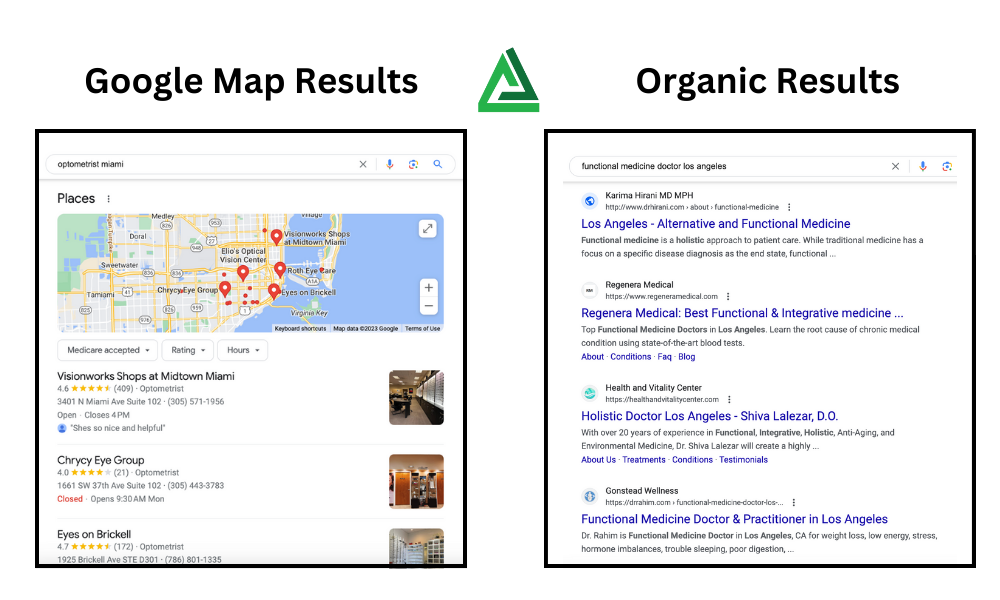
How Patients Search for Doctors
Jane: Do you happen to know a good gynecologist?
Mary: Mine is good. Here is her office phone number.
Nowadays, the internet has completely transformed the game. Now, when people need medical services, they head straight to search engines.
They may type in general search terms like “doctor near me” to explore a broad range of options in their local area. Additionally, they may search for more specific terms like ” pediatric ENT doctor” or “gynecologist near me” to narrow down their search and find specialists in a particular field.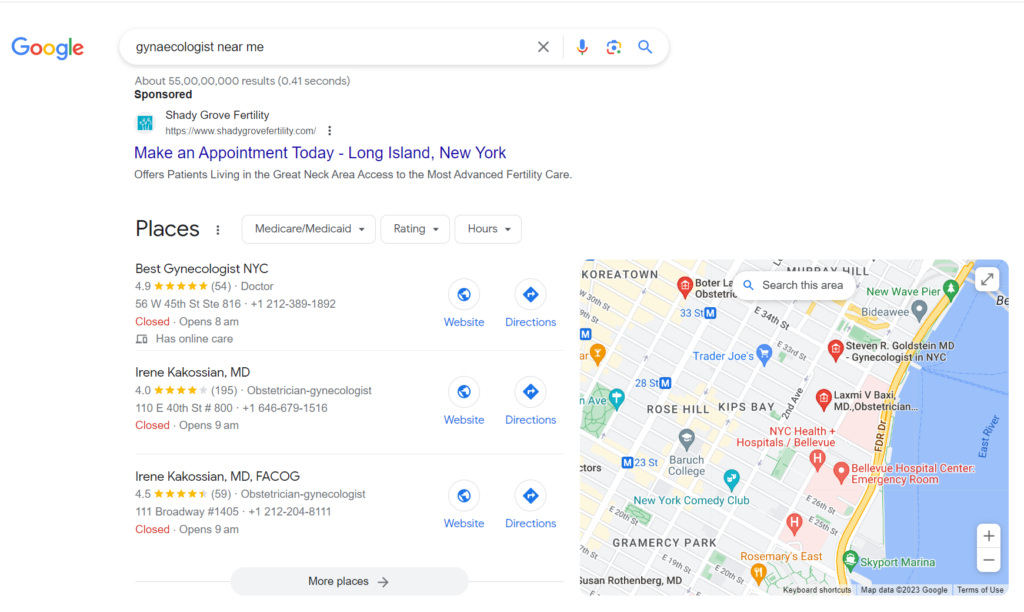 Even if the above conversation did happen, Jane would still whip out her tablet to check out the recommended doctor (I know, I would). Patients can search based on location, specialty, patient reviews, and other criteria to find the right doctor for their needs.
Even if the above conversation did happen, Jane would still whip out her tablet to check out the recommended doctor (I know, I would). Patients can search based on location, specialty, patient reviews, and other criteria to find the right doctor for their needs.
Now we know where and how prospective patients search, the next (biggest) task is to show up in those searches more often. That’s why SEO for doctors is more crucial than ever before.
So, here’s the deal: If you want to get patients through your doors, you better prioritize SEO. Over 80% of individuals won’t bother scrolling past the first page of Google results when searching for doctors. To be seen and chosen, you need to dominate that first page.
By implementing strong SEO strategies tailored specifically for doctors, you’ll make it a breeze for prospective patients to find your website and feel compelled to pay you a visit. It’s time to get ahead and make your online presence stand out!
Benefits of SEO for Doctors
Apart from improving the ranking of a website in search engine results pages (SERPs), SEO for doctors has multi-fold benefits:
- Enhanced credibility and trustworthiness among potential patients.
- Attracting new patients and growing the practice.
- Higher rankings in search engine results pages (SERPs) lead to more organic traffic to your website.
- Better targeting of specific medical services and specialties.
- Improved patient engagement and user experience on your website.
- Increased opportunities for patient acquisition and appointment bookings.
- Cost-effective compared to traditional marketing methods.
- Long-term benefits as SEO efforts continue to generate results over time.
- Competitive advantage over other doctors who do not prioritize SEO.
- Provides valuable insights into patient preferences and behavior through analytics.
Key Components for Search Engine Optimization for Doctors
There are no hacks or shortcuts when it comes to search engine optimization. As I always say, to win the SEO game, you have to go by the master plan. Understanding and careful implementation of the key components is a must for the effectiveness of SEO strategy for doctors. The components complement each other and build on each other.
Keyword Research for Doctor SEO: What do patients search for online?
Keyword research is a vital process that helps you identify the specific terms your target audience is using when searching on search engines like Google. For instance, if you’re a nephrologist specializing in kidney stones, you’ll want to focus on the keywords “kidney stone removal,” “Emergency kidney stone surgery in New York,” and “Recurrent kidney stone treatment”.
Tip: For doctors, “near me” searches are common across all practices and specializations.
The best practice is to incorporate these targeted keywords into your content. This will increase the likelihood of attracting relevant traffic to your website and capturing the attention of potential patients in your area.
1. Use free tools like Google Trends and Google Keyword Planner:
Explore search trends, analyze keyword ideas, filter by location, and even identify long-tail keywords used for your practice niche.
This is what Google Trends look like: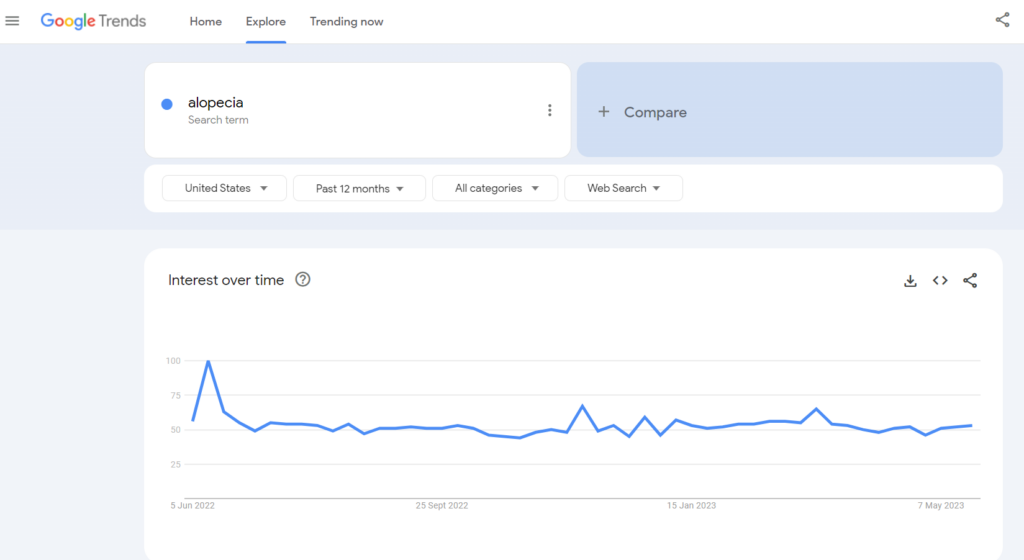
Google Keyword Planner for keyword suggestions:
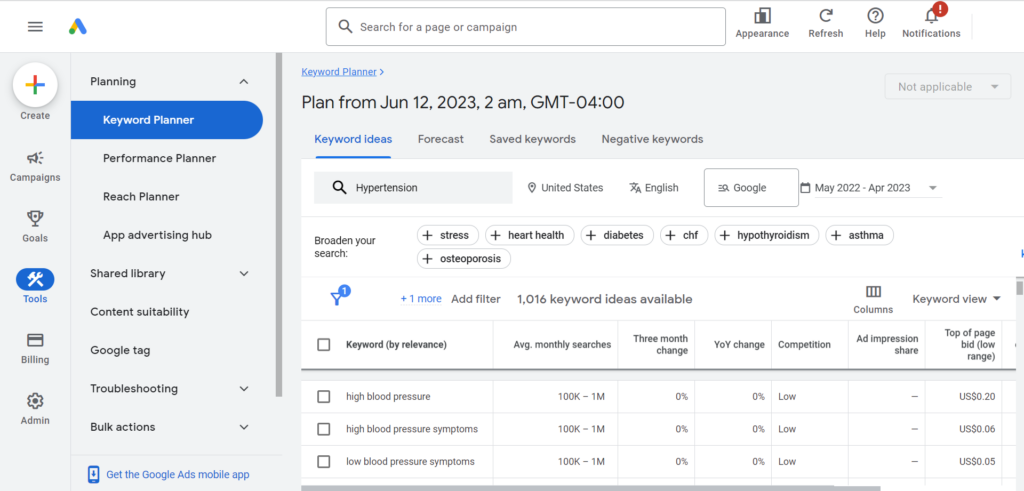
2. Related Searches and People Also Ask (PAA) section:
My experience tells me that the “Related searches” section works great for long tail keyword ideas alongside your primary keywords.
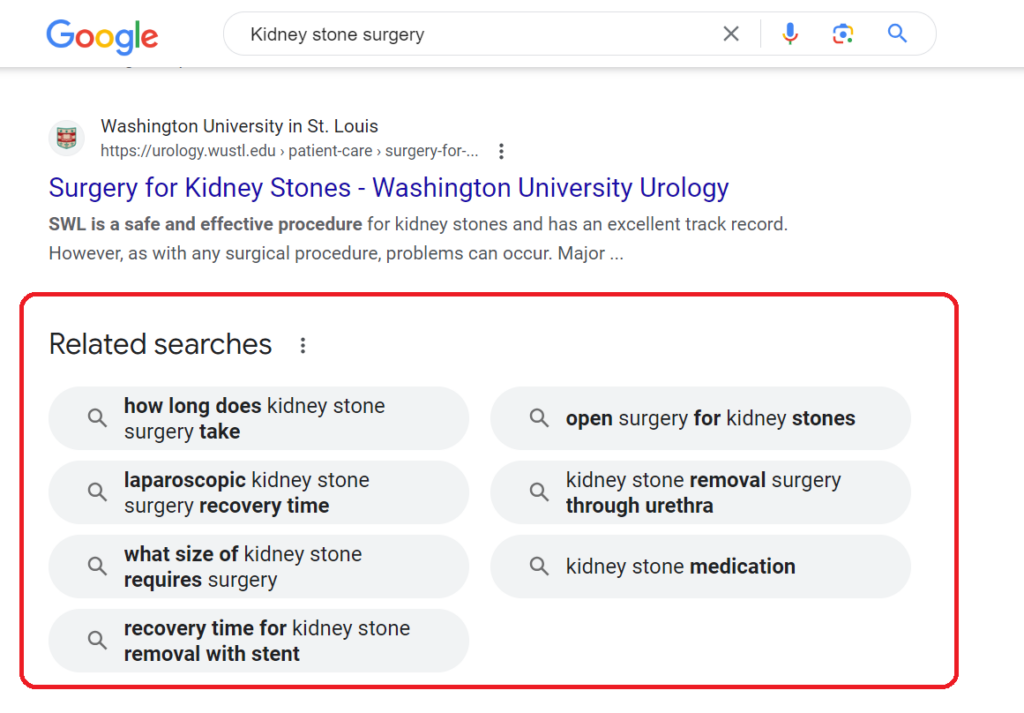
The “People also ask” section is a goldmine to get relevant content ideas because these are the questions patients are actually looking for answers to. I recommend doctors optimize for “People Also Ask”, as every question provides an answer with a link to the source.
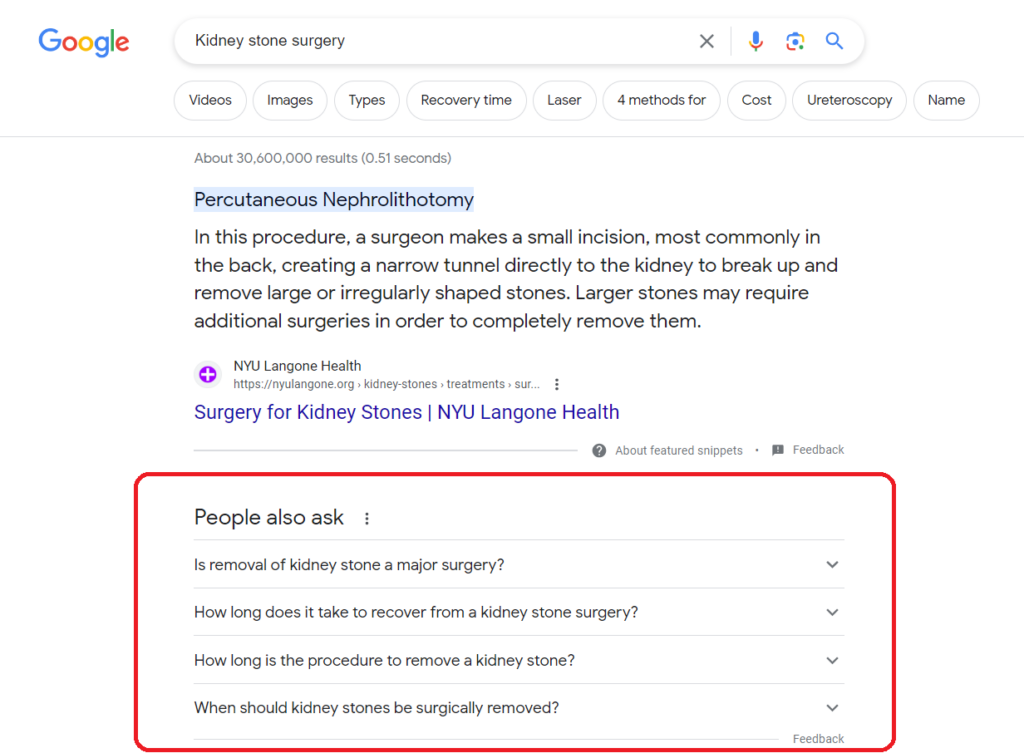
3. Premium tools like Ahrefs and SEMrush:
These powerful tools provide advanced features and comprehensive data for keyword research, competitive analysis, backlink analysis, and more. With Ahrefs, you can analyze competitor keywords, track rankings, and explore content opportunities. SEMrush offers insights into keyword difficulty and domain authority and helps optimize on-page SEO.
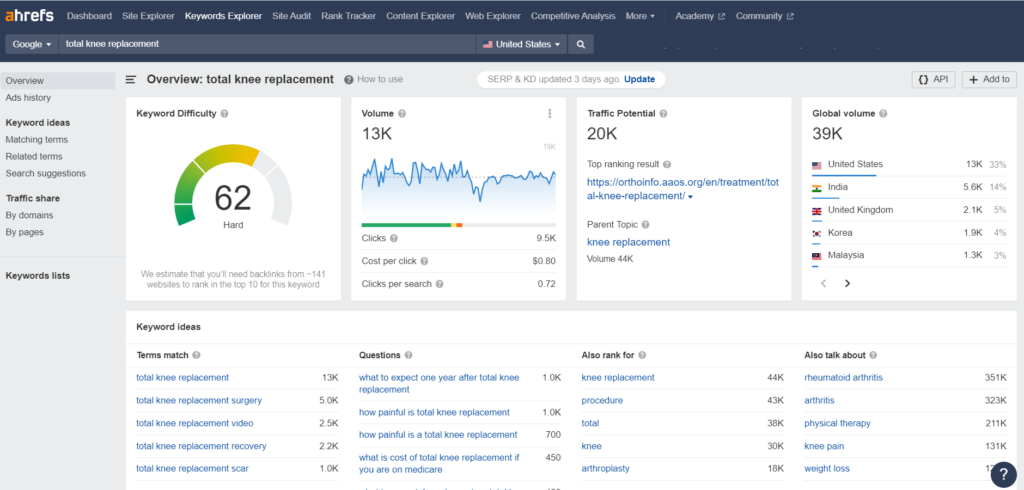
On-Page SEO for a Doctor Website
Having quality content on your website is one thing. It should also make the SEO cut. Optimizing on-page content for target keywords so it effectively shows up in online searches will drive more traffic to your medical website. This is how you can go about with on-page SEO for doctors:
Meta titles and descriptions: Your website’s page titles should include your location and the keywords you want to rank for. For example, your meta title should include your location, such as “Doctor in Nevada” or “Los Angles Urgent Care Provider.”
URL structure: Include target keywords in URLs without overstuffing them, ensuring they remain user-friendly and not spammy.

Optimized content creation: There is really no substitute for well-written content. This includes articles, blog posts, and more that address the needs and concerns of your patients while seamlessly incorporating the right keywords.
Heading tags and formatting: Content separated into bite sized portions is easier to consume. Structure your content for both search engines and readers with H1, H2, and H3 tags and appropriate formatting (bold, italics) for emphasis.
Local SEO for Doctors
Unless you exclusively offer telemedicine, the majority of your customers would be patients that live nearby. Local SEO helps doctors to appear on top in response to location-specific and relevant searches. Google places massive importance on whatever doctors are closest. That’s just something I found the SERPs do for medical websites.
Google My Business optimization: If you are a medical practitioner, there is a fair chance that your Google My Business profile already exists, whether you have created it or not. The best thing you can do here is claim your Google My Business listing. Next, verify your business details like name, address, contact number and website. This is what Google is going to show to potential patients.
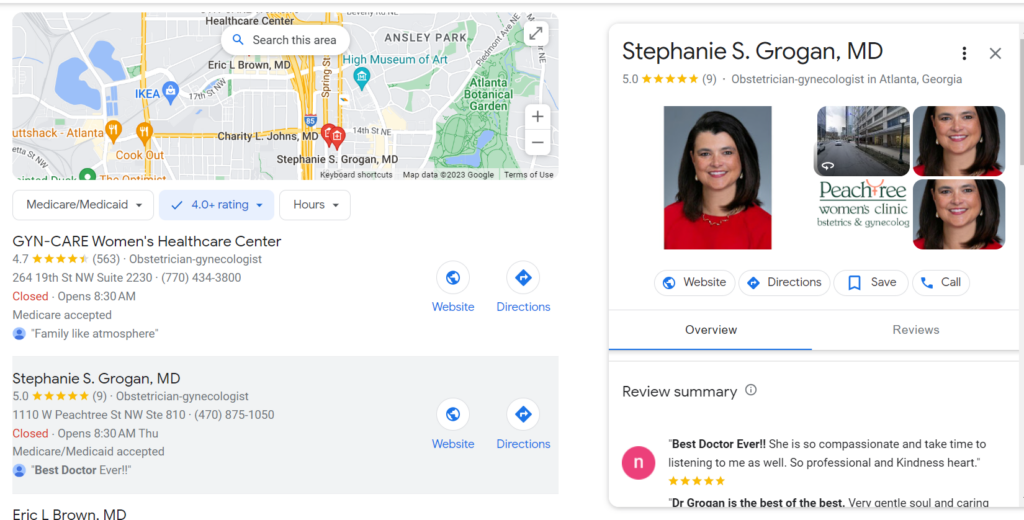
Online reviews and reputation management: 72% of patients use online reviews to evaluate a doctor’s services. Encourage patients to leave reviews on your Google My Business listing. This builds a positive online reputation. In my experience, the doctors that respond to reviews have that extra edge over their competitors, as this demonstrates their commitment to patient satisfaction and care.
Local citations and directory listings: List your medical practice on reputable healthcare directories to increase your visibility in local search results. Ensure consistent and accurate information, including your practice name, address, and phone number (NAP), across all listings.
Off-Page SEO for Doctors
Off-page SEO is crucial for medical practitioners for building the reputation and authority of their website in the eyes of search engines and users.
Link-building strategies: Focus on acquiring backlinks from reputable and authoritative websites within the healthcare industry. Seek opportunities for guest blogging, content contribution, and collaborations with relevant publications or organizations.
Social media presence and engagement: Facebook has the ultimate pull on search rankings. If you do not have a Facebook page for your website, you are losing landscape and visibility. So do it now. Having Twitter, LinkedIn, or Instagram also helps. Share informative and relevant content, interact with your audience, and foster meaningful connections within the healthcare community.
Online reviews play a big role for Doctors: Monitor online mentions across various platforms, including review sites like BBB (Better Business Bureau). Respond promptly and professionally to both positive and negative feedback. Address concerns and demonstrate your commitment to patient satisfaction and quality care.
Technical SEO for Doctor Websites
Technical SEO improves a website’s performance which directly adds to user experience. When patients visiting your site find it valuable and easy to navigate, they will spend more time on it. This impacts other key factors, such as reduced bounce rates, increased page views, and higher time-on-site metrics. The important key components in technical SEO for doctors are:
Website speed and performance optimization: Optimize images and media files to reduce their file sizes and improve loading times. Implement caching and compression techniques to minimize server response time and enhance overall website performance.
Mobile-friendly optimization: Ensure that your website has a responsive design that adapts to different screen sizes and devices. Mobile-friendly websites are favored by search engines and provide a better user experience for visitors accessing your site from smartphones or tablets.
Schema markup: Incorporate schema markup, such as JSON-LD or microdata, to provide search engines with structured data about your practice. Highlight and display important information, such as ratings, reviews, and contact details, in search results.
XML sitemaps: Generate XML sitemaps that list all the important pages on your website and submit them to search engines. Ensure that all important pages are included for indexing.
The most important factors for Doctor SEO
Although SEO is fundamentally the same across many industries, I have always found SEO for medical practitioners significantly different from other niches. For starters, all medical practices fall under Google’s YMYL category. Also, Google highly ranks medical content from trusted sources that comply with its E-E-A-T guidelines.

No matter how much you optimize your website, it will not appear in the top search results until it satisfies the E-E-A-T and YMYL criteria set by Google.
Another way to put it is Google is happy to receive content from expert medical practitioners like yourself. As a doctor, it is a great opportunity for you to write content that helps patients answer their questions and search engines receive authoritative and trusted content.
How can you comply with Google YMYL and EEAT?
In order to practice doctor SEO in accordance with these parameters, here’s what you should do:
- Showcase Your Credentials: Display qualifications, certifications, and affiliations prominently to establish expertise.
- Provide Accurate Information: Ensure content is accurate, up-to-date, and supported by credible sources.
- Use clear and concise language. Avoid using jargon or technical terms that your audience may not understand. Use clear and concise language that is easy for a general audience to understand.
- Include Patient Testimonials: Showcase genuine testimonials and reviews to build trust.
- Publish Authoritative Content: POST high-quality, informative content that positions you as an authority.
- Comply with Medical Ethics and Regulations: Ensure adherence to relevant medical ethics guidelines and legal regulations governing the medical profession. This includes maintaining patient confidentiality and privacy.
SEO Services for Doctors
Drive New Patients To Your Medical Practice Website
[spacer]SEO for Doctors – How to Leverage AI
In this fast-paced world of technology, it is essential for a doctor like you to be well-versed in basic AI tools. It is not about learning how to code these tools but just about how to use them to assist you in your marketing and patient engagement activities.

Here are some ways in which AI can help with SEO for doctors:
- Content creation: AI can be used to generate high-quality, relevant content that is optimized for search engines. For example, AI can be used to create blog posts, articles, and other content relevant to your target audience.
- Keyword research: AI can be used to identify the most relevant keywords for your website and industry. This can help you to target your content and improve your chances of ranking for relevant search terms. For example, AI can be used to analyze search trends and identify the keywords that are most commonly used by people searching for information about your services.
- Natural Language Processing: AI-powered tools equipped with natural language processing capabilities can analyze the content on your website, identify semantic relationships between words and phrases, and provide suggestions to improve the context and relevance of your content. This helps search engines better understand and rank your content.
- Voice Search Optimization: With the increasing popularity of voice assistants, AI can help optimize your website for voice search queries. AI algorithms can analyze conversational patterns and natural language queries to help you adapt your content and target long-tail keywords that align with voice search queries.
- Social media Post Captions: No need to think for several minutes about that perfect caption that would go with your image. Give this task to AI, and you’ll be better off.
- Reply to GMB comments: Thinking of words for saying thanks to a patient can again take several minutes of your precious time. Take help from AI for such tasks.
And yeah, in case you want to thank me for all these amazing ideas, send me an email at ajay@authorityventures.com 🙂
Out-of-the-Box SEO Strategies For Doctors
Gone are the days when there used to be just one doctor in the area, and patients had no options. With tough competition, it is necessary that you stand out from the crowd. Here are some out-of-the-box ideas to be different.
Start a blog – Starting a blog will help in search engine optimization as it will be a platform providing fresh and helpful content. You’ll be able to target long-tail keywords, and local key phrases, create internal links, attract backlinks, and get some amazing articles to be shared on social media. This aligns your medical website with Google EEAT as quality content establishes expertise.
Make a personal brand – Have a dedicated doctor page on your medical website. Do not shy away from showcasing your degrees, specializations, and experience online. This also includes sharing your own picture on Google My Business, showcasing your clinic, patient results etc.
Videos – Shoot some YouTube videos. Conduct interviews or appear for an online interview whenever you get a chance. Create shorts for Youtube. Don’t just focus on marketing but on building a brand by providing education so new patients can recognize you.
Real posts on social media – Many doctors make the mistake of hiring a social media agency that shares all crap. Instead of graphics, put real pictures of yourself, your clinic, your patients, etc. It all accounts for SEO for doctors.
Featured snippets: Featured snippets help doctor websites by providing concise answers to common medical questions, hence showcasing their expertise. A well-structured content with clear headings, subheadings, and schema markup makes it easier for search engines to understand and extract relevant information.
SEO reporting for Doctors
To effectively track how much traffic your SEO efforts are bringing, set up a quick reporting schedule. Include the following checkpoints:
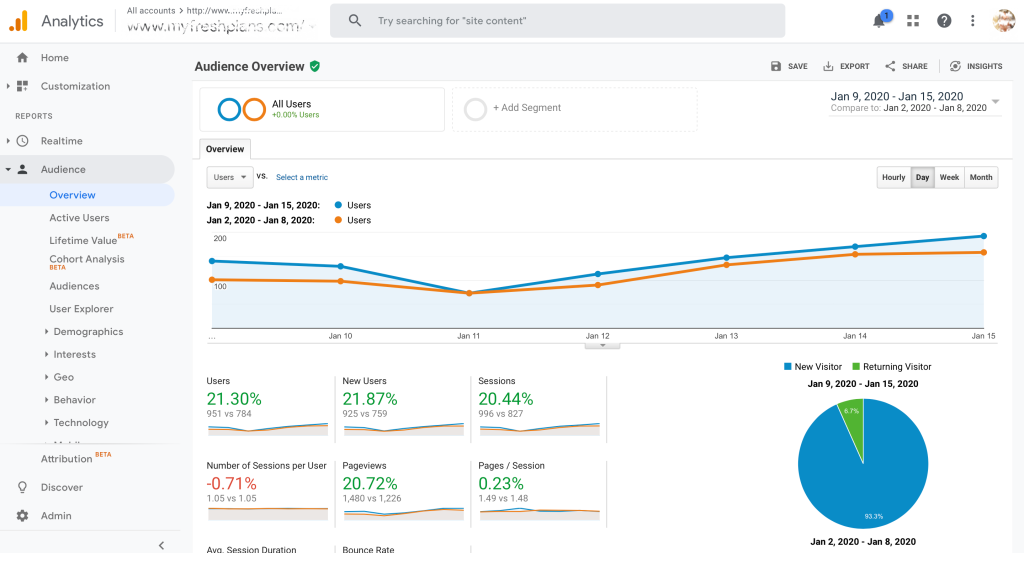
Setting up website analytics: Implement tools like Google Analytics and Google Search Console to gain valuable insights into your website’s performance. Track key performance indicators (KPIs) such as organic traffic, keyword rankings, and user behavior.
Monitoring and analyzing SEO metrics: Regularly evaluate your keyword rankings and visibility in search engine results. Analyze website traffic patterns, bounce rates, and conversion rates to understand how users interact with your site. Identify trends and areas for improvement.
Making data-driven improvements: As a doctor, use analytics data to refine your SEO strategies. Adjust keyword targeting, optimize content, and improve user experience based on metrics and feedback. Stay data-driven to attract more patients and improve online visibility.
Doctor SEO FAQs
Doctors’ most important ranking factors are those demonstrating their expertise and experience. These include: 1. Education: The doctor’s educational background is a major factor in determining their ranking. This includes the type of medical school they attended, the number of years they spent there, and the degree they earned. 2. Experience: The amount of experience a doctor has in a particular field is a major factor for their ranking on the first page.
1. Not having a website: One of the most common SEO mistakes doctors make is not having a website. Without a website, it is difficult for potential patients to find you online and learn more about your practice. Additionally, having a website is essential for SEO, as it provides a platform for you to optimize your content and rank higher in search engine results.
2. Not optimizing for local search: Another common mistake doctors make is not optimizing for local search. Local businesses can rank on the first page of Google search results by optimizing for local key phrases.
The best SEO tools for doctors depend on their individual needs and the size of their practice. Some of the best free SEO tools for smaller practices include Google Search Console, Google Analytics, and Google My Business. These tools allow you to monitor your website’s performance, track your website’s rankings, and understand how your website is performing in search ranking. For intensive SEO, there are a variety of paid SEO tools available.
SEO is a one-time effort: This is one of the most common SEO myths that doctors believe. SEO is an ongoing process that requires regular updates and maintenance to ensure your website is optimized for search engine algorithms. SEO is an ever-evolving practice that requires constant attention and effort to stay ahead of the competition.
SEO is only about keywords: While keywords are an important part of SEO, they are not the only factor.
Doctors can leverage SEO to gain more online visibility. By consistently showing up in search results, they will get more calls and appointments.
While it’s not mandatory, hiring an SEO specialist can be beneficial. They have expertise in optimizing websites for Google and other search engines, ensuring your practice stand out in a competitive online landscape.
Absolutely! Blogging allows you to create informative content that targets relevant keywords, attracts potential patients, and establishes your expertise in the medical field. By regularly publishing high-quality blog posts, you satisfy the Google E-E-A-T criteria.
Google values reviews as one of the most important ranking signals. Often, the Google “3 Pack” lists practices near the top with several 5-star patient reviews. Doctors need to focus on this if they want to grow their local SEO.
From our website – Authority Ventures. Check out our Glossary & blogs for all the updated information about new SEO techniques.




